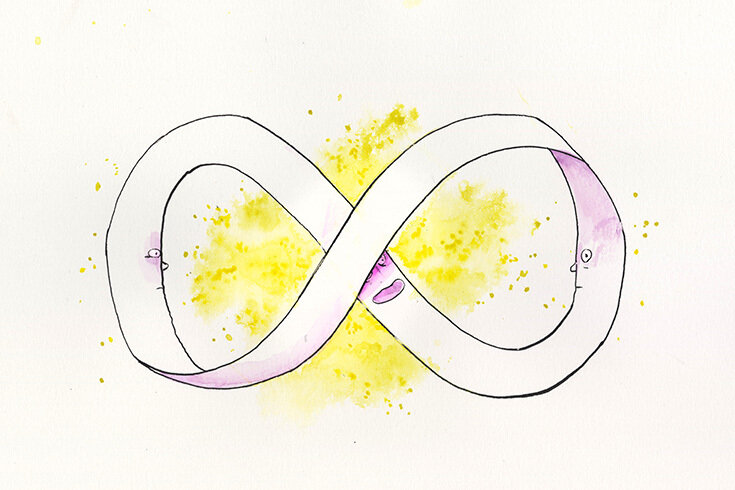
This past summer, I came down with my third case of COVID-19, only eighteen days after my second. Once I updated colleagues and a few close contacts, I shared the news on Twitter, illustrating what I’d learned—that recent illness is currently no guarantee of future immunity and that both infections followed my participation at unmasked gatherings (part of the widespread reopening of Ontario, where I live). The post was unexpectedly controversial, garnering thousands of replies over the next few days.
As is often the case when you talk about COVID-19, the responses reflected a range of perspectives. There were people who had barely felt safe leaving the house over the past couple of years, people ready to move on from COVID-19, and even people who think the pandemic is a hoax. One guy, who claimed he was double vaxed and had spent his summer maskless at large events, including a BC Lions game, said he got the coronavirus only once and didn’t see what the fuss was about. I was tempted to congratulate him on his summer, which sounded a lot more fun than mine, and (perhaps futilely) to encourage him to get that first booster shot more than half of Canadians have yet to receive.
I’m not in the habit of getting into fights online, and while it was discomfiting to be called a “sheep” for being vaccinated, I controlled my urge to fact-check some of the trolling—the discussion soon stopped being about me anyway. What began to emerge was just how different everyone’s experiences with COVID-19 have been. Many of the responses showed a genuine lack of knowledge about COVID-19, what vaccination can do, the difference between a PCR and a rapid test, and why masks work. Some commenters claimed vaccines reduce the body’s immunity, even though they literally do the opposite (my ability to write this letter while sick is probably thanks to my vaccines and booster shot). However much we talk about COVID-19—The Walrus alone has published dozens of features on the pandemic since 2020—it’s still not enough. The facts are not getting through.
The experience brought home something we live by at The Walrus, which is that education is key to our ability to talk to one another. But that doesn’t mean it’s enough to be highbrow and impress everyone with what we know. As our founders recognized when they registered The Walrus as a charity, in 2005, a status granted through an educational mandate, just because something is academic doesn’t mean it’s educational, and just because something is important, that doesn’t mean it’s interesting. The challenge for our contributors is to use facts not just to impart information but to draw readers in.
A number of stories in this issue do exactly that—strike a tone both educational and engaging—on a range of subjects. Matthew Braga’s investigation into the enduring appeal of childhood classics such as the Rubik’s Cube, the Etch A Sketch, and Play-Doh isn’t just a report on the fortunes of the toy industry; his transporting feature, “Survival of the Funnest,” explores the joy and power of play. One of the story’s most insightful lessons is how much influence adults have in sharing their favourite toys with kids. We learn from one another, even in the fun we share.
Ainslie Cruickshank’s story is actually about education: in “Climate in the Classroom,” the BC-based writer discusses the implications of oil-and-gas companies providing lesson plans for teachers. As her reporting finds, the way kids learn about a topic like the climate crisis frames their understanding of it and also affects the likelihood that they’ll feel positioned to do something.
Whether it’s school walkouts by teens in solidarity with climate activists like Greta Thunberg or the disrupting of political rallies via TikTok, young people have demonstrated over the past few years that it’s a mistake to underestimate them. Wondering what they might do with a platform like The Walrus inspired us to create a space for their voices. Our new online series for teens, which received over 100 submissions, explores issues that range from whether the voting age should be lowered to the effects of pandemic lockdowns on education. A short story, “The Gate of Heavenly Peace,” by seventeen-year-old writer Yan Xi Li, appears in this issue. We hope the exchange provides something for us all to learn from, now and in months to come.







